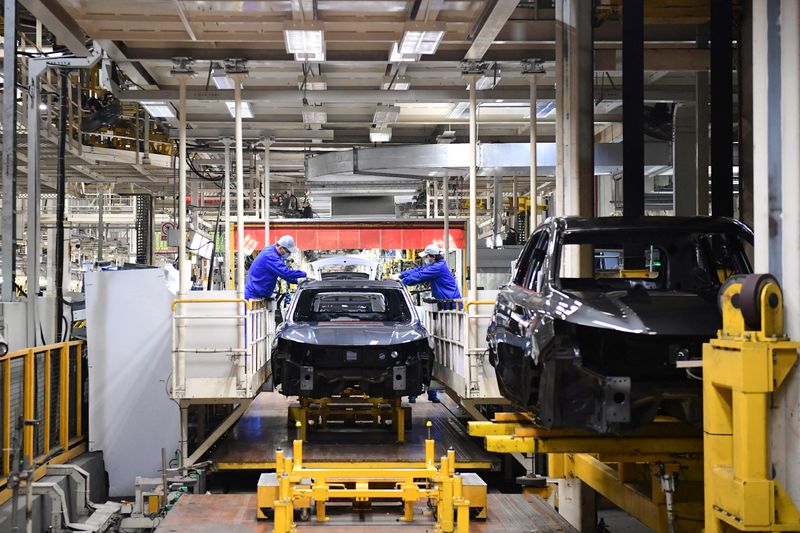SHANGHAI (Reuters) - Companies reopening factories in locked-down Shanghai are booking hotel rooms to house workers and turning vacant workshops into on-site isolation facilities as authorities urge them to resume work while complying with tough COVID-19 curbs.
Hundreds of companies including multinationals Tesla (NASDAQ:TSLA) and 3M (NYSE:MMM) have reopened factories in the Chinese economic hub under local guidelines requiring them to isolate workers inside a "closed-loop".
But executives say they are not yet running at full capacity and describe the process as far from straightforward, given the logistical hassles of compliance, including a lack of space, and having many workers remain stuck at home in locked-down housing compounds.
Without on-site living space, U.S.-based 3M has been booking hotels for its factory workers, complying with closed-loop rules by transporting them between the plant and their lodgings, said its China president, Ding Hongyu.
But finding rooms is difficult as many Shanghai hotels are already occupied by medical workers and others managing the city's massive effort to fight COVID.
"This is a rather big challenge," Ding told reporters on Thursday. "There is currently limited supply of suitable hotels or accommodation that fulfil our requirements."
Some automakers, including General Motors (NYSE:GM), have asked workers to sleep on factory floors, sources told Reuters.
French industrial gas producer Air Liquide (EPA:AIRP) said it prepared temporary dormitories and partnered with local industrial parks to house roughly 200 workers.
The rules require larger plants to create makeshift hospitals and isolation sites to house and check for any positive cases.
At Volkswagen (ETR:VOWG_p)'s joint venture with SAIC Motor, the old motor workshop, the size of several basketball courts and previously a staff entertainment centre, is now used to isolate positive cases, their close contacts, as well staff entering the factories to ensure they are free of the coronavirus, SAIC Group said.
SAIC Group said it also calls for personal sleeping space for each worker if possible, and 2 metre (6 foot) separation between beds if not. Workers are discouraged from taking showers at communal facilities and should use pails instead, the company said.
TO THE BATTLEFIELD
The month-long lockdown brought business in Shanghai to a near-standstill, prompting backlash from industry.
Earlier this month, China's industrial regulator published a list of 666 companies prioritised to restart or keep production going, making an example of Tesla's much-hyped April 19 reopening, although the plant is operating at just half capacity.
Shanghai authorities said last week about 70% of the companies had restarted operations. Industrial output dropped 7.5% in March, the first monthly decline in two years.
Besides site preparations, getting workers back is also a multi-step process.
Only those living in "low-risk" areas can be recalled. Shanghai authorities said on Friday that such residents accounted for about half of the city's 25 million people.
Staff then must test negative for COVID to obtain a "work resumption" pass. Multiple companies also require workers to isolate on company premises and test further under a two- to three-day "quiet period" before allowing entry to factories.

Once inside, it is unclear for staff when they will be able to come back out amid the uncertainty over how long Shanghai's lockdown will last.
"To go back to the factory now is like going back to the battlefield," said a back-to-work car company employee, declining to be named as he was not permitted to speak to the media.